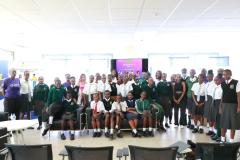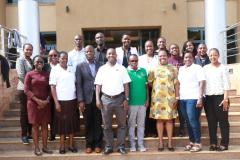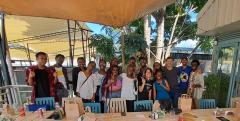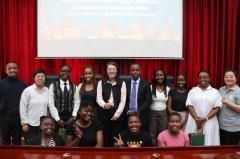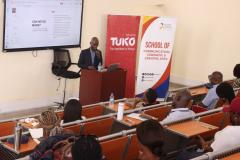- Mastercard Foundation
- Students
- Prospective Students
- Current Students
- Academic Catalog, Academic Calendar & Fee Schedule
- Student Portal (WebApp)
- Student Email
- Blackboard
- Digital Repository
- Library and Information Center
- Placement and Careers
- Resource Downloads
- Online Installment Plan Application
- Pre-Registration Check
- Search Course Schedule
- View / Download Course Catalogue
- Online Tuition Fee Refund Application
- Campus This Week
- Faculty & Staff
- Alumni
- Parents
- Helpdesk
- Home
- Academics
- Admissions
- Life At USIU-Africa
- Student Support Services
- Academic Catalog, Academic Calendar & Fee Schedule
- Academics, Transformational Teaching, Learning and Research
- Student Life
- Course Advising
- Financial Aid
- Library and Information Center
- Placement and Careers
- Gender Equity and Protection Office
- Disability and Inclusion Office
- Counseling Center
- Internships
- Student Exchange
- University Health Service
- Online Installment Plan Application
- Online Tuition Fee Refund Application
- Student Information
- Recreation
- Student Support Services
- Research
- Giving
- About USIU-Africa
- Quicklinks
Disability and Inclusion Office
About the DIS Office
The Disability and Inclusion (DIS) Office coordinates and facilitates services for students, staffs and faculty and USIU-Africa community with medical, physical, psychological, and learning disabilities. Students, staffs and faculty who may require academic and social services due to a disability or medical condition should contact the Office of Disability and Inclusion to discuss their needs and possible ways of assistance. Disability related requests for accommodations and services are evaluated individually, based on documentation as per the PWD Policy at USIU-Africa.
In compliance with the Persons with Disabilities Act No. 14 of 2003 (Kenya), an individual with a disability is defined as a person who "has a physical or mental impairment which substantially limits one or more major life activities of such an individual; has a record of such an impairment; or is regarded as having an impairment." Services for students with disabilities are provided by almost all areas of USIU-Africa services from Dean of Student’s office, Academic advising, Admission’s office, Registrar’s, accommodation/Hostel’s office, Security and Human Resource etc. but they are all coordinated through DIS office. The DIS office is also available to meet with any staff, student and faculty who may be wondering if they have a disability and seeking an evaluation, assistance or additional information to assist them.
Our Vision
To be a premier department that facilitates and celebrates equity, diversity and disability inclusion within the University and beyond.
Our Mission
To lead the university in its commitments to recognize disability as a valued aspect of diversity, to embrace access as a matter of social justice, and to design more welcoming and inclusive learning environments.
Our Objectives
- To coordinate, facilitate and enhance experiences of students, staffs and faculty with Disability and Special Needs for academic excellence.
- To sensitize the USIU–Africa community on disability etiquette to prevent and manage discrimination, unfair labeling, harassment, marginalization, and victimization of PWD & SN.
- To guide in the recruitment, retention process and facilitate graduation and employability for PWD & SN.
- To enhance inclusion and equitable participation in university governance, programs, and activities for PWD & SN.
- To support all departments, schools and sections of the University including service providers in responding to the needs of PWD and SN.
Our Core Values
- We recognize disability as a dimension of human variation and consider it to be an interaction between the person and the artificially-created barriers to physical, educational, economic, social, and policy environments.
- We support university standards and integrity by valuing high expectations for all students, including those with disabilities
- We value civility, respect and integrity in accordance with the USIU-Africa Policies.
- We pursue the eradication of stigma and embrace the uniqueness and dignity of each person.
- We believe in the ability of students, faculty and staffs to succeed and thrive and consider their responsibility to support and encourage their personal growth and autonomy.
Our Office | Hours
Office of Disability and Inclusion Services at USIU-Africa,
Freida Brown Student Center | QVMH+P3J | Ground Floor
Academic Year Hours: Monday to Friday, 8:30 am to 5.00 pm (EAT)
Contact Information
Phone Number:
+254 730 116 830
Mailing Address
United States International University – Africa
On USIU Road, Off Thika Road (Exit 7),
P. O. Box 14634 – 00800,
Nairobi, Kenya, East Africa.
By Racheal Ngumi
As part of the annual observance of the International Day of Persons with Disabilities on December 3, USIU-Africa formally launched the Disability Inclusion Center, which was established to assist the university community especially the Persons with Disabilities in accessing quality service and education in learning requirements while at an institution of higher learning. The Center provides an availability of technology through information systems, and technologies; hardware, and software whereby they are accessible and usable to Persons with Disabilities and Special Needs, thus advancing the disability mainstreaming agenda.
The annual observance of the International Day of Persons with Disabilities was proclaimed in 1992, by the United Nations General Assembly resolution 47/3. The observance of the Day aims to promote an understanding of disability issues and mobilize support for the dignity, rights and well-being of persons with disabilities. It also seeks to increase awareness of gains to be derived from the integration of persons with disabilities in every aspect of political, social, economic and cultural life.
In its Disability Policy, USIU-Africa commits to providing equal opportunities and support to all its diverse members including Persons with Disabilities and Special Needs. The university further recognizes and respects the rights of specific individual and group needs of Persons with Disabilities and Special Needs. Moreover, the University shall, therefore, progressively provide reasonable adjustments for inclusive and quality education to enable them actualize their full potential.
Disability Inclusion is a life transforming event for persons with disabilities. This video demonstrates how USIU-Africa, and other partners of the Mastercard Foundation are working together to break down systematic barriers to inclusion and create accessible opportunities in education and work.
World Humanitarian Day (August, 19): An Opportunity to Celebrate Persons with Disability (PWD)
by Solomon Njengah
Introduction and History
According to the United Nations, August 19 is dedicated to mark World Humanitarian Day (WHD). It all began on August 19, 2003 when a bomb went off at The Canal Hotel in Baghdad, Iraq, killing 22 humanitarian aid workers, including the UN Special Representative of the Secretary-General for Iraq, Sergio Vieira de Mello. Five years later (2008), the United Nations General Assembly adopted a resolution designating August 19 as World Humanitarian Day (WHD). Each year, WHD focuses on a theme, bringing together partners from across the humanitarian system to advocate for the survival, well-being and dignity of people affected by crises, and for the safety and security of aid workers. Many aid workers end up becoming disabled due to harsh reality while fighting for the rights of less privileged in the World.
Humanitarian Action and Persons with Disability
According to World Bank report (2020), one billion people, or 15% of the world’s population are the most vulnerable especially those in the humanitarian context especially in the developing world where the disability prevalence is higher. PWDs are more likely to experience adverse socioeconomic outcomes such as less education, poorer health outcomes, lower levels of employment, and higher poverty rates.
Poverty may increase the risk of disability through malnutrition, inadequate access to education and health care, unsafe working conditions, a polluted environment, and lack of access to safe water and sanitation. Disability may also increase the risk of poverty, through lack of employment and education opportunities, lower wages, and increased cost of living with a disability.
Inclusion of Persons with Disabilities in Humanitarian Action
While inclusive humanitarian action for persons with disabilities is an emerging area for most actors implementing the UN Convention on the Rights of Persons with Disabilities (CRPD), the endorsement of the Charter on Inclusion of Persons with Disability in Humanitarian Action brought a new breath to this whole phenomenon. International Organizations including CBM, Humanity & Inclusion – Handicap International (HI), and the International Disability Alliance (IDA) marked the International Day of Persons with Disabilities by releasing a collection of 39 examples of field practices inclusive of persons with disabilities in humanitarian context and disaster risk reduction (DRR), from 20 countries of intervention. The report shows that deliberate and proactive action is required to ensure that persons with disabilities from all constituencies are systematically included and meaningfully participate in DRR and humanitarian preparedness, response and recovery. It draws lessons from field practices, but does not provide technical guidance.
Why we mark World Humanitarian Day
Across the globe, humanitarian workers help the world’s most vulnerable people when disaster strikes. Persons with disability are among the most vulnerable in disaster context but why should we celebrate the day?
- To celebrate humanitarian aid workers who provide life-saving assistance to suffering people all over the world. Those workers who live in conflict zones or in areas devastated by natural disasters are especially vulnerable;
- To pay tribute to aid workers killed and injured in the course of their work, and to honor all aid and health workers who continue, despite the odds, to provide life-saving support and protection to people most in need, and commit to doing everything possible to protect them and their vital work;
- To educate the public on issues of concern, to mobilize political will and resources to address global problems, and to celebrate and reinforce achievements of humanity;
- To help people who are suffering and saving lives any time any place in the world while being responsible, conscious of the circumstances of other people's lives, and assisting them on the basis of need, without discrimination;
- To advocate for increased participation of persons with disabilities and their representative organizations in humanitarian response and recovery;
- To remove barriers to access humanitarian assistance and protection though projects in which persons with disabilities are at the center of assessing and addressing those barriers, and examples of humanitarian actors seeking external technical support;
- To influencing coordination mechanisms and resource mobilization, such as through disability-focused coordination mechanisms, as well as by influencing national Humanitarian Response Plans and pooled funding.
by SOLOMON Njengah
Introduction and History
United Nations declared 12 August as the International Youth Day and is commemorated every year. in 1999, the UN General Assembly in its resolution 54/120, endorsed the recommendation made by the World Conference of Ministers Responsible for Youths (Lisbon, 8-12 August 1998) that 12 August be declared International Youth Day. The day is a global opportunity for youth across the world to organize activities that raise awareness about the situation of youth in their countries.
Youth with Disability
Though the actual figures are uncertain on the exact number of youths with disability in the world, one thing is clear – that individuals with disabilities form a significant proportion of the youth population in every society. The number of youth with disabilities is likely to increase due to the large youth populations in most developing countries and to medical advancements which promote higher survival rates and life expectancy after impairment-causing diseases, health conditions, and injuries. In fact, youth itself can be a contributing factor to disability as young people are at an increased risk of acquiring a disability through such incidents as road traffic accidents, injuries from diving and other sport activities, violence and warfare (Aito et al. 2005, Cripps 2003, Karacan et al. 2000).
Challenges faced by Youth with Disability and Alleviation strategies by The Convention on the Rights of Persons with Disabilities (CRPD)
According to UNICEF (2013), youth with disabilities are among the most marginalized and poorest of the world’s youth population and are more likely to face severe social, economic, and civic disparities as compared with those without disabilities, even in developed countries.
For many young people with disabilities, exclusion, isolation, and abuse as well as lack of educational and economic opportunities are daily experiences. However, The Convention on the Rights of Persons with Disabilities (CRPD) and with the 2030 Agenda for Sustainable Development are making strides towards the greater inclusion of youth with disabilities in society and development, as well as toward the realization of their human rights. According to United Nation’s Department Of Economic And Social Affairs Disability Section, there are numerous challenges that affects youth with disability. Latest reports highlight some of the challenges, which include;
- Poverty: While young people in general experience poverty at higher rates than their older counterparts, youth with disabilities are especially at risk of falling at or below the poverty line. The CRPD notes this crisis of poverty among persons with disabilities; Article 28 calls for the creation of poverty-reduction programs targeted at persons with disabilities and their families.
- Lack of education: Youth with disabilities have a lower probability of entering, staying or advancing in school than children without disabilities (World Health Organization, 2011). Article 24 of the CRPD addresses these inequalities and seeks to ensure that persons with disabilities are included in the general education system and that individual supports and accommodations are provided to facilitate the development of their full potential.
- Transitional challenges to work and financial independence: Many young people with disabilities face a difficult period of upheaval and uncertainty as they transition from childhood into adulthood, primarily with regards to achieving successful employment and independent living.
- Unemployment: Unemployment rates for youth with disabilities are higher than for the rest of the youth population in every society (Mitra, Posarac & Vick, 2013). Article 27 of the CRPD stipulates that all persons with disabilities, including youth, have the right to work. To this end, many governments (local, regional and national) have implemented incentives for hiring persons with disabilities as part of efforts toward a more inclusive society.
- Rejection: Young people with disabilities often experience rejection and seclusion due to their peers’ misconceptions, or prejudices. Feelings of loneliness and isolation may be reinforced by activities and spaces that are inaccessible to persons with disabilities. CRPD avers that, concerted efforts are needed to raise awareness and disseminate accurate information that challenges misconceptions and stereotypes about persons with disabilities.
To date, most societies have not fully integrated youth with disabilities, leading to the exclusion and isolation of a large and important segment of the population. Clearly, more work is required to create an integrated and equitable world for youth with disabilities. Providing opportunities for full and equal social, civic, economic, and political participation is beneficial not only to youth with disabilities, but also their surrounding societies, allowing youth to contribute fully to the country’s development and economic growth to fullest extent of their abilities.
The CRPD and the 2030 Agenda for Sustainable Development offer a plan for including all persons with disabilities in all aspects of society and development. The implementation and realization of this plan will require focused attention and effort by all stakeholders, especially Governments and policy makers, to ensure that the rights of persons with disabilities remain a priority and that all persons may exercise the same rights regardless of disability status.
By Beryl Kamusinga
Getting favorable employment in Kenya can be a headache, especially in the field you want. According to an online poll, only 33% of disabled people are employed. This can be attributed to the fact that many employers have a bias against people with disabilities. This could be because of systemic beliefs that people with disabilities aren't effective workers or the employers don’t have and are unwilling to create an environment suitable for people with disabilities.
Fortunately, institutions like USIU-Africa do not have such misgivings, and employment is solely based on merit. USIU-Africa has for years had a reputation of being inclusive, to both students and staff. One of the benefits of working at USIU-Africa is its toxic-free working environment, and understanding and patient supervisors.
This is according to one of USIU-Africa employees Winnie Wambura, an employee of the institution who has a physical disability as a result of an accident when she was two years that crushed the bones in her leg.
“When I had the accident, I was rushed to Ombo Hospital, where the doctors recommended the amputation of my leg. However, I was taken to Mater Hospital, where a metal plate was inserted in my leg, which allowed me to walk, and rejoin the bones together. She had her last operation in 1999 to remove the metal plate since the bones had connected “she said.
Winnie studied Information Science at Kenya Methodist University and has been working for the institution in the Library department for the past four years. She had previously worked as an intern for six months before being formally employed.
Winnie asserted that USIU-Africa had been her dream institution to work at ever since her brothers enrolled as students. She constantly applied from her first year to get an internship for her first year of university before finally succeeding.
She applauded the institution for giving her a job based solely on her passion rather than her disability. She added that learning continued for her at USIU-Africa as she is able to practically apply what she learned at University.
She credits USIU-Africa for being a good employer, particularly for being diverse. “It is a very conducive environment to work in”, she says, further noting that she enjoys working at the institution because there is no micromanagement.
“Disability doesn’t define or reflect a person's capabilities. It’s time society stopped thinking of disability in terms of what someone can’t offer. We should start looking at disabled people in terms of what they can offer despite their challenges,” she notes.
Winnie plans to further her studies abroad by going to study for her Masters in Information Science, currently not offered at USIU-Africa.
By Beryl Kamusinga
USIU-Africa has consistently worked in ensuring that differently-abled students have ease of movement and suffer very few inconveniences in their day-to-day activities. Medical conditions such as Cerebral Palsy need not be a reason to forgo a university education. Movement can be improved through surgeries that are expensive and multiple surgeries might be needed. One such student who has experienced this is Vihir Sumriya, who has undergone about ten surgeries in his life to enable him to walk.
Vihir Sumriya is a fourth-year student of Applied Computer Technology student concentrating on Cybersecurity. He chose to attend USIU-Africa because of its facilities and in particular the infrastructure that the University has put in place to ensure that the campus is convenient for differently-abled students.
“USIU-Africa has been conducive for my studies because it has made it easy for me to get around campus. The Faculty members have been keen to assist me in any capacity required, any requests that I have made have been swiftly handled,” he said.
Vihir, who has consistently been on the Dean's list for academic achievement, found the atmosphere of USIU-Africa welcoming from the moment he first got into the institution.
“USIU-Africa has been welcoming to my needs. One of the most important ways that the University supported me was by switching my classes to a more accessible classroom to make it easier for me to attend my classes. The University also fixed an elevator in one of the buildings to make attending classes more convenient. I have built good working relationships with my lecturers, who have been accommodative of my needs,” he added.
He notes that the University can continue to improve its facilities by making more provisions for students who have hearing and sight impairments.
By Elizabeth Wanjiku
The USIU-Africa Persons with Disabilities Club, in collaboration with the Disability Inclusion Office and the Sports Department hosted the Inclusive Sports Day on February 29, to mark the Low Vision Awareness month.
The day commenced with an opening ceremony presided by Ms. Halima Bakari from the Sports Department and Ms. Elizabeth Wanjiku from the Disability Inclusion Office who welcomed the guests, and also kicked-off the first game, goal-ball, with the hosting team and invited guests facing off. The game was played concurrently with inclusive scrabble and chess at the Basketball court, while adopted swimming was conducted at the swimming pool.
The sports event officiated by external experts in para-sports, provided an avenue for individuals with low vision to showcase their talents and participate actively alongside their peers, with winners in each activity receiving a medal award according to merit.
The players and participants invited from Thika primary, University of Nairobi and Machakos Teachers College, were awarded at the closing ceremony where the Guest Speaker, Mr. Henry Wanyoike, a World Record holding Paralympic made his final remarks.
“We have to show the world that we can also make it in life. The only way to demand opportunities is for us to be prepared to be excellent once the opportunities are accorded to us. I have known the power of sports and how far sports can take a person. If we want the world to know our potential, then we have to prepare and train because there are a lot of opportunities,” he said.
Metrocare Health Clinic was on ground and conducted free eye screening services in a bid to address eye health, enabling participants to check their visual health and gain insights into preventing low vision and potential blindness.
This pioneering initiative set a precedent for future events, highlighting USIU-Africa's commitment to fostering an inclusive campus environment where everyone is valued and supported.
Featured Documents [ More ]
Latest News [ More ]
- Artificial Intelligence and the Media IndustryApr 05, 2024

